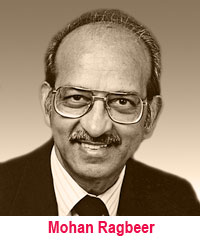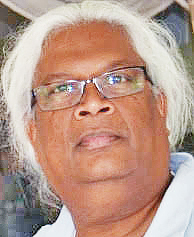Opinions
Prema Satsangh

A visiting history professor from India was present, endorsed my views, remarking that few academics in India have explored the subject; he would introduce them to this other view of history. I left them copies of the two books and would gladly send them more.While this oasis of love sang uplifting bhajans and chanted healing prarthanas, evil agents of crass materialism were busy destabilising (=pre-digesting) President Maduro and Venezuela, whose major crime had been to fall into US clutches a century ago, when oil was found in plenty in Lake Maracaibo, enriching Venezuelans in high society and government, making them thralls of America for good, until a few leaders saw the mass of starving, jobless and underemployed mestizos and los pobres, and tried to help them. Simon Bolivar would be proud.
Curiously, Trump’s initial months in office and his stream of accusations and one-sided actions to the right reminded me of the installation of Hugo Chavez in Venezuela in 2000 under an amended constitution, and how two years later, the CIA instigated (and naturally denied) a coup and brief ouster of Chavez, (by the same methods used in British Guiana in 1962-4), until their choice, Pedro Carmona, President of the Venezuelan Chamber of Commerce (no known relation to T&T’s Carmona), did stupidly Trump-like things and was deposed by the same wave that had toppled Chavez. But the poor from urban barrios finally exerted their will and strength, aided army loyalists and restored him.
Of interest, Chavez also accused the press, the rich, the RC church and private corporations, of bias and publishing false news. Interesting too, is that George Bush used a Chavez phrase, slightly paraphrased, in his warmongering, “Those that are not for us are against us.” It is doubly curious that one of the charges against Chavez was his Plan Bolivar, which used the military to improve social services, in three ambitious stages: work for peace, work for community, work for nation, each with laudable objectives to improve the lot of the poor, neglected and exploited by the conservatives and wealthy.
Sadly, as happened elsewhere, these social schemes quickly deteriorated, as generals in charge found ways of siphoning off huge amounts; for this Chavez got blamed. Also curious, is that Chavez was pilloried for ruling by decree, just as Trump started to do in January 2017.
Carmona was more extreme, in the opposite direction; he cancelled Chavez’s laws, and quickly became an elite oligarch, alienated labour, the military, and obviously swamped by rightists, presumably at CIA (Cheney-Bush-Rumsfeld) plotting, through an American firm called Venoco, in which Carmona was involved, had allegedly helped to finance the coup and had been pulling strings behind the scenes. Carmona, like Trump, was no politician, but unlike Trump, he did not have to fend off American business interests. Venezuelan media giants violated their responsibility to broadcast the news, studiously refusing to keep citizens abreast of events. Familiar?
Ironically, it was US CNN that eventually did the right thing. But the CIA seemed set on regime change; it fomented a long strike after Chavez’s reinstatement, supported the Coordinadora democratica (Democratic Coordinator), which joined the reform process but refused to abide by an authenticated referendum to recall the President; Chavez won 59%.
The NY Times confirmed US involvement by denying it in 2002! But it later published a note that the Bush administration and CIA knew, but officially did not condemn the coup. Enter Eva Golinger, an American turned Venezuelan, and publicist for the latter Government. Her book, The Chavez Code makes interesting reading and exposes the seamy side of American business-directed foreign policy. In a recent blog she described US tactics as: “infiltrate, recruit, and neutralize the adversary from within, or by one of its own – a painful, shocking betrayal that creates distrust and fear amongst the ranks,” and “The most effective tactics the FBI used against the Black Panther Party and other radical movements for change in the United States were infiltration, coercion and psychological warfare.”
Welcome, Prema Satsangh; grow and prosper!
Taking a trip to a small town
 Romeo Kaseram
Romeo Kaseram
I remember one of my first trips when I was growing up back home was having the good fortune to be included in the family entourage making the solemn journey to take my sick aunt to the doctor’s office in the small town outside our village.
Back in those days it took some planning ahead before the decision was made to travel to the small town, or worse, to make an expensive trip to the doctor. Any trip beyond the confines of our sugarcane fields was an upheaval in the known universe of the household, with pre-planning needed for what was called “passage-money” to pay for transport,
which meant digging up the “cash-pan” from its secret location among the trees in the backyard. Also, it meant negotiating the cost for transport and booking ahead with the one person in the village who owned a car. It was certainly a headache added to my auntie’s belly-ache, with all of the planning, head-scratching, and the secretive trip to the backyard in the dead of night to dig up the “cash-pan” with its meagre savings. To make such a decision, along with corollary expenses, meant everything had to be done to the point of dead-sure certainty that auntie was close to death.
Now to arrive at confirmation she was in the grip of a serious illness meant elimination of all the cheaper and easily-available “medicines”, which meant trying them out all and hoping at least one worked for the ailment at hand. Despite my auntie holding her lower belly and bawling in pain like a cow bloated with wind, she first had to endure a virulent purge made from a noxious and ill-tasting infusion of boiled senna pods.
When this did not work on her tortured soul, she was then subjected to a muscled belly-rub for the malady called “naara”, the hands made strong by a lifetime of field work doing the massage powerfully applying a searing mix of pungent mustard and coconut oils. Following the failure of the “naara” to unwind and relocate, a wide range of poultices, mostly made from itchy and scratchy leaves, was then unmercifully applied to her forehead and tied with a broad cloth to the small of her back.
Nothing worked to ease my auntie’s pain. Instead, she continued to hold her head with both hands, bawling non-stop, and making frightening, unsettling statements in desperation, as: “All you hold my hand! I trembling from head to foot! I feeling I going to dead right here! We going to have a funeral in this house!”
The poultice was a desperate, last-ditch measure to avoid visiting the buried “cash-pan”. It meant reaching out for help beyond the village, a “message” urgently sent to the old woman living where the bamboos shivered and moaned whenever the wind blew. The rumours were this lady dabbled in the dark arts, changing into a ball of fire and flying across the sky on full moon nights. The messenger mandated with this task departed quickly, the dark night swallowing up the sounds from his feet, the circle of light from the lamp swinging rapidly in the distance as he hurried away.
This old woman arrived in the wake of the lamp light carried by the returning messenger. She was an octogenarian who suffered so badly from curvature of the spine she walked with one hand gripping a highly-varnished cane that had as many knobs on it as did her nose, dragging one foot behind the next, her other hand curled and the back of her fingers pressing down to support the small of her back.
She was fiercely independent and confident of her knowledge, talking down to the other ladies gathered around the bed, her voice hoarse, gravelly, and imperative with her ascendant role as an invited sick-room consultant. She walked into the bedroom and was right away elevated as the senior poultice consultant, the other ladies making room for her by respectfully standing aside, bowing deferentially to her magical presence and her putative knowledge of local herbs and medicinal plants.
After she had dispatched her eager helpers to various locations among the cane fields with specific directions where to locate the required plants, along with finite instructions about the quantity of leaves needed from specific branches, she sat totally oblivious as my auntie writhed in pain, playing a game of clickety-clack, clickety-clack with her false teeth, and watching me maliciously with cloudy eyes, knowing I was regarding her as a fraud, irritated as I counted the knobs on her nose, my head moving back and forth as I compared them with the carbuncular knots on her walking cane.
Naturally, the poultices did not work miracles. My auntie’s health deteriorated to the point where the now worried family gathered around, held a quick ‘panchayat’, and made the group decision to take her to the town and its one practicing doctor.
I was fortunate to make the pick, sitting on someone’s bony knee, my auntie moaning with each pothole the car hit as it worked its way through the unmerciful fields of sugarcanes.
